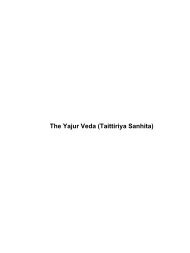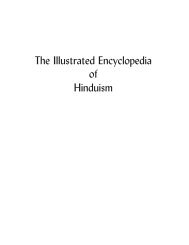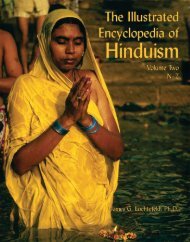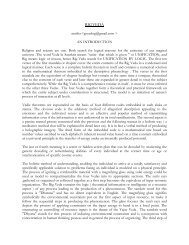A Concise Encyclopedia of Hinduism Klaus K Klostermaie
You also want an ePaper? Increase the reach of your titles
YUMPU automatically turns print PDFs into web optimized ePapers that Google loves.
57 Devï<br />
progressive: he rejected casteism, promoted<br />
the equality <strong>of</strong> women and men,<br />
and insisted on social service and altruism<br />
as expressions <strong>of</strong> true DHARMA.<br />
death<br />
A major preoccupation <strong>of</strong> <strong>Hinduism</strong>, as<br />
<strong>of</strong> all religions. Hindus generally believe<br />
in life after death and most believe in<br />
rebirth (and re-death) <strong>of</strong> those who<br />
have not found emancipation. It is<br />
surrounded by many rituals, and many<br />
scriptures describe the fate <strong>of</strong> persons<br />
after death. Since physical death is not<br />
considered final, the Bhagavadgïtä compares<br />
it with the changing <strong>of</strong> worn-out<br />
clothing and exhorts not to grieve for<br />
those who have died, because they are<br />
bound to return in a new body. (See<br />
also AFTERLIFE; MØTYU-SA§SKÄRA.)<br />
demons<br />
<strong>Hinduism</strong> knows many kinds <strong>of</strong><br />
demons, or antagonists <strong>of</strong> the gods. Not<br />
all <strong>of</strong> them are wicked; some are<br />
described as righteous rulers and good<br />
kings. (See also ASURA; BALI; DAITYAS;<br />
DÄNAVAS; RÄKÆASA.)<br />
related to Latin deus, Greek theos, from<br />
which French dieu, Italian dio, Spanish<br />
dios, English divine). Their number is<br />
given in the Vedas as thirty-three, in<br />
later <strong>Hinduism</strong> as virtually infinite.<br />
(See also GOD AND GODS.)<br />
deva-däsï<br />
(‘female servant <strong>of</strong> the deity’)<br />
A woman who was dedicated to temple<br />
service, pr<strong>of</strong>essional dancer, <strong>of</strong>ten kept<br />
as temple prostitute.<br />
Devakï<br />
Wife <strong>of</strong> VASUDEVA, mother <strong>of</strong> Kø•æa.<br />
Devï (‘goddess’)<br />
Used generically as well as more specifically<br />
for the wife <strong>of</strong> Ÿiva, or the highest<br />
principle, imagined as female. She has<br />
many names, expressing her many functions.<br />
Goddess worship is almost universal<br />
in <strong>Hinduism</strong>.<br />
Deussen, Paul (1845–1919)<br />
‘Devasena’, as his Indian friends called<br />
him, an expert in Sanskrit and in philosophy.<br />
He held university appointments in<br />
Berlin and Kiel. In his six-volume General<br />
History <strong>of</strong> Philosophy he devoted the first<br />
three volumes to India, including translations<br />
<strong>of</strong> hitherto unknown texts. He translated<br />
sixty Upani•ads from Sanskrit into<br />
German, Ÿaökara’s complete commentary<br />
on the Brahmasütras, as well as major<br />
portions from the Mahäbhärata (including<br />
the Bhagavadgïtä) and wrote a monograph<br />
on The Philosophy <strong>of</strong> the<br />
Upani•ads (1899).<br />
deva, also devatä (‘shiny’)<br />
Generic name <strong>of</strong> higher beings, usually<br />
translated as ‘god’ (etymologically<br />
Devï Mahj•amärdiæï: The goddess who<br />
slays the buffalo demon; an object <strong>of</strong><br />
devotion at the time <strong>of</strong> Dürgä Püjä.


















